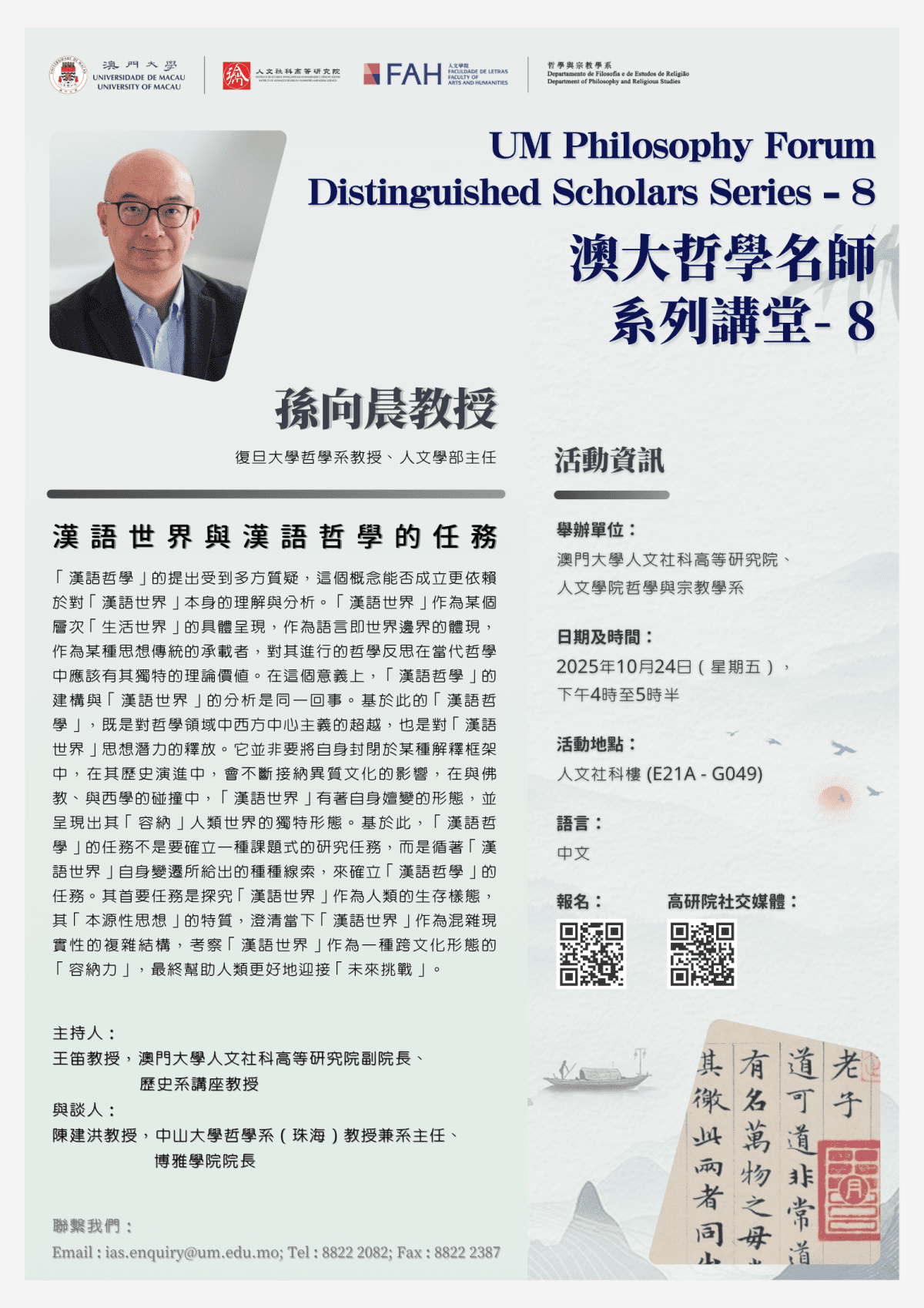【IAS&FAH-DPHIL】UM Philosophy Forum Distinguished Scholars Series – 8 & 9 (October 24 and 27, 2025; 4:00 – 5:30 PM)
【IAS&FAH-DPHIL】澳大哲學名師系列講堂 - 8 & 9 (2025年10月24日及27日; 下午4時至5時半)

| The IAS promotional video has been launched! We cordially invite you to watch and help spread the word! | ||
|
English |
|
中文 |
 On the occasion of the fifth anniversary of the Institute for Advanced Studies in Humanities and Social Sciences at the University of Macau, we would like to express our gratitude for your unwavering support to us. Your involvement and support have helped build a strong foundation for our interdisciplinary research platform and inspired us to keep moving forward. The IAS is excited to carry on our mission, rooted in Macau, by organizing high-quality academic activities that showcase the diversity of academic collaboration. On the occasion of the fifth anniversary of the Institute for Advanced Studies in Humanities and Social Sciences at the University of Macau, we would like to express our gratitude for your unwavering support to us. Your involvement and support have helped build a strong foundation for our interdisciplinary research platform and inspired us to keep moving forward. The IAS is excited to carry on our mission, rooted in Macau, by organizing high-quality academic activities that showcase the diversity of academic collaboration. |
||
Dear Colleagues and Students,
The Institute of Advanced Studies in Humanities and Social Sciences (IAS) and Department of Philosophy and Religious Studies of the Faculty of Arts and Humanities (FAH-DPHIL) cordially invite you to participate in the UM Philosophy Forum Distinguished Scholars Series – 8 & 9. We have invited renowned philosophers and scholars from both local and international backgrounds to share their academic insights, with various professors from different departments within the university serving as hosts and discussants. This initiative aims to foster interdisciplinary communication and collaboration. Please see the details below:
- Organisers: Institute of Advanced Studies in Humanities and Social Sciences; Department of Philosophy and Religious Studies, FAH
- Date & Time: October 24 (Fri) & October 27 (Mon); 4:00 – 5:30 PM
- Location: Humanities and Social Sciences Building, E21A-G049 (Fri); Library Auditorium, E2-G012 (Mon)
- Language: Chinese (Fri); English (Mon)
We look forward to seeing you at these events! For more information about IAS, please visit the website of IAS at https://ias.um.edu.mo/. Should you have any questions, please do not hesitate to contact us at ias.programme@um.edu.mo.
Best regards,
The Institute of Advanced Studies in Humanities and Social Sciences
各位親愛的同事、同學:
澳門大學人文社科高等研究院(高研院)及人文學院哲學與宗教學系現誠邀您參與澳大哲學名師系列講堂 – 第八講及第九講,除了邀請到海內外哲學專家學者分享其學術見解,更由校內不同學系教授擔任主持人、與談人,旨在促進學科間的交流協作。詳情請參閱如下:
- 舉辦單位:澳門大學人文社科高等研究院、人文學院哲學與宗教學系
- 日期及時間:10月24日(星期五)及10月27日(星期一);下午4時至5時半
- 地點:人文社科樓 E21A-G049(星期五);圖書館演講廳 E2-G012(星期一)
- 語言:中文(星期五);英文(星期一)
我們誠邀各位教職員、學生及有興趣人士出席,期待在活動中見到您。有關高研院更多内容,請訪問高研院網站:https://ias.um.edu.mo/。如果您有任何疑問,請通過電子郵件的方式隨時與我們聯繫:ias.programme@um.edu.mo 。
澳門大學人文社科高等研究院 謹啓
| 澳大哲學名師系列講堂 – 8 | |
|---|---|
| 主題 | 漢語世界與漢語哲學的任務 |
| 報名鏈接 | https://go.um.edu.mo/99hmij7c |
| 講者 | 孫向晨教授(復旦大學哲學系教授、人文學部主任) |
| 主持人 | 王笛教授(澳門大學人文社科高等研究院副院長、歷史系講座教授) |
| 與談人 | 陳建洪教授(中山大學哲學系(珠海)教授兼系主任、博雅學院院長) |
| 日期及時間 | 2025年10月24日(星期五),下午4時至5時半 |
| 地點 | 人文社科樓 E21A-G049 |
| 摘要 | 「漢語哲學」的提出受到多方質疑,這個概念能否成立更依賴於對「漢語世界」本身的理解與分析。「漢語世界」作為某個層次「生活世界」的具體呈現,作為語言即世界邊界的體現,作為某種思想傳統的承載者,對其進行的哲學反思在當代哲學中應該有其獨特的理論價值。在這個意義上,「漢語哲學」的建構與「漢語世界」的分析是同一回事。基於此的「漢語哲學」,既是對哲學領域中西方中心主義的超越,也是對「漢語世界」思想潛力的釋放。它並非要將自身封閉於某種解釋框架中,在其歷史演進中,會不斷接納異質文化的影響,在與佛教、與西學的碰撞中,「漢語世界」有著自身嬗變的形態,並呈現出其「容納」人類世界的獨特形態。基於此,「漢語哲學」的任務不是要確立一種課題式的研究任務,而是循著「漢語世界」自身變遷所給出的種種線索,來確立「漢語哲學」的任務。其首要任務是探究「漢語世界」作為人類的生存樣態,其「本源性思想」的特質,澄清當下「漢語世界」作為混雜現實性的複雜結構,考察「漢語世界」作為一種跨文化形態的「容納力」,最終幫助人類更好地迎接「未來挑戰」。 |
| UM Philosophy Forum Distinguished Scholars Series – 9 | |
| Theme | To Speak the Unspeakable – The Wisdom of the Unsayable in the Chinese Tradition |
| Registration | https://go.um.edu.mo/o23qd9ot |
| Speaker | Prof. Karl-Heinz Pohl (Professor Emeritus of Sinology, Trier University, Germany) |
| Moderator | Prof. Shaoyang Lin (Head of Academic Programme and Publication of IAS, Distinguished Professor of Department of History, FAH) |
| Discussants | Prof. Xiangchen Sun (Professor of School of Philosophy, Head of the Division of Humanities, Fudan University); Prof. Ellen Zhang (Professor of Department of Philosophy and Religious Studies, FAH) |
| Date & Time | 27 October 2025 (Mon), 4:00 – 5:30 pm |
| Location | Library Auditorium, E2-G012 |
| Abstract | The mode of speaking about the unspeakable is a paradox – the saying of the unsayable is a contradiction in terms, after all. Regarding wisdom, this paradoxical mode of speaking leads to themes such as “wisdom as non-wisdom”, “knowledge as ignorance” etc. Hence, the paper foremost deals with such paradoxes or contradictions in itself. There are two parts: The first part discusses the “Western tradition” of “Saying the Unsayable” from the ancient Greek to the modern period (such as in Scepticism). The second part deals with the respective mode of speaking in the Chinese tradition, as in the Daoist classics Daodejing (道德經) and Zhuangzi (莊子), as well as with respective Buddhist notions, such as in the Madhyamaka school (中觀學派), the Vimalakirti-Sutra (維摩詰所説經) or the Diamond-Sutra (金剛經). Concluding, there are also references to this mode of speaking in art and poetry. In the Chinese tradition, the implicit poetic mode (“meaning beyond words”, yan wai zhi yi 言外之意) is a very peculiar way of saying the unsayable. |


